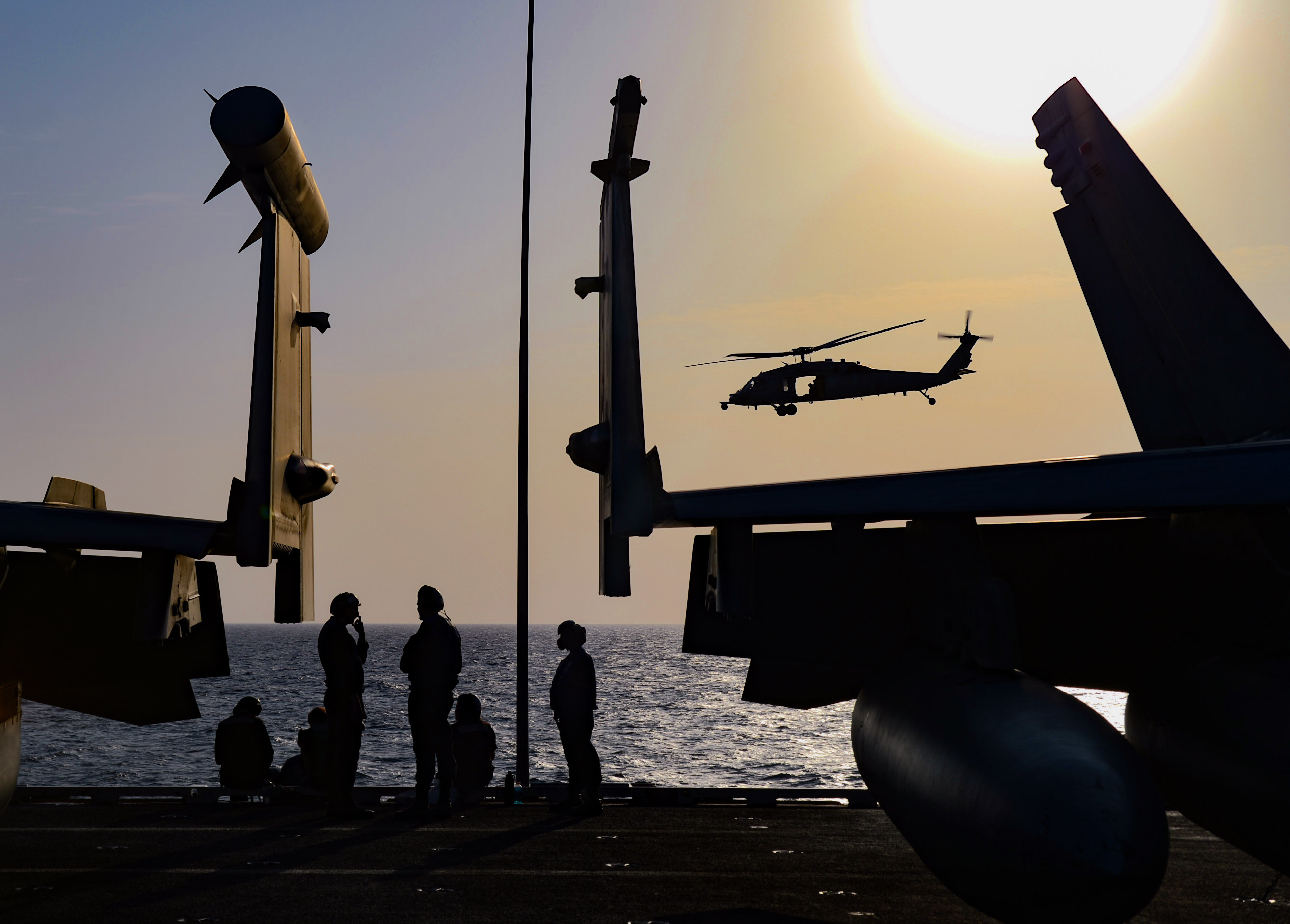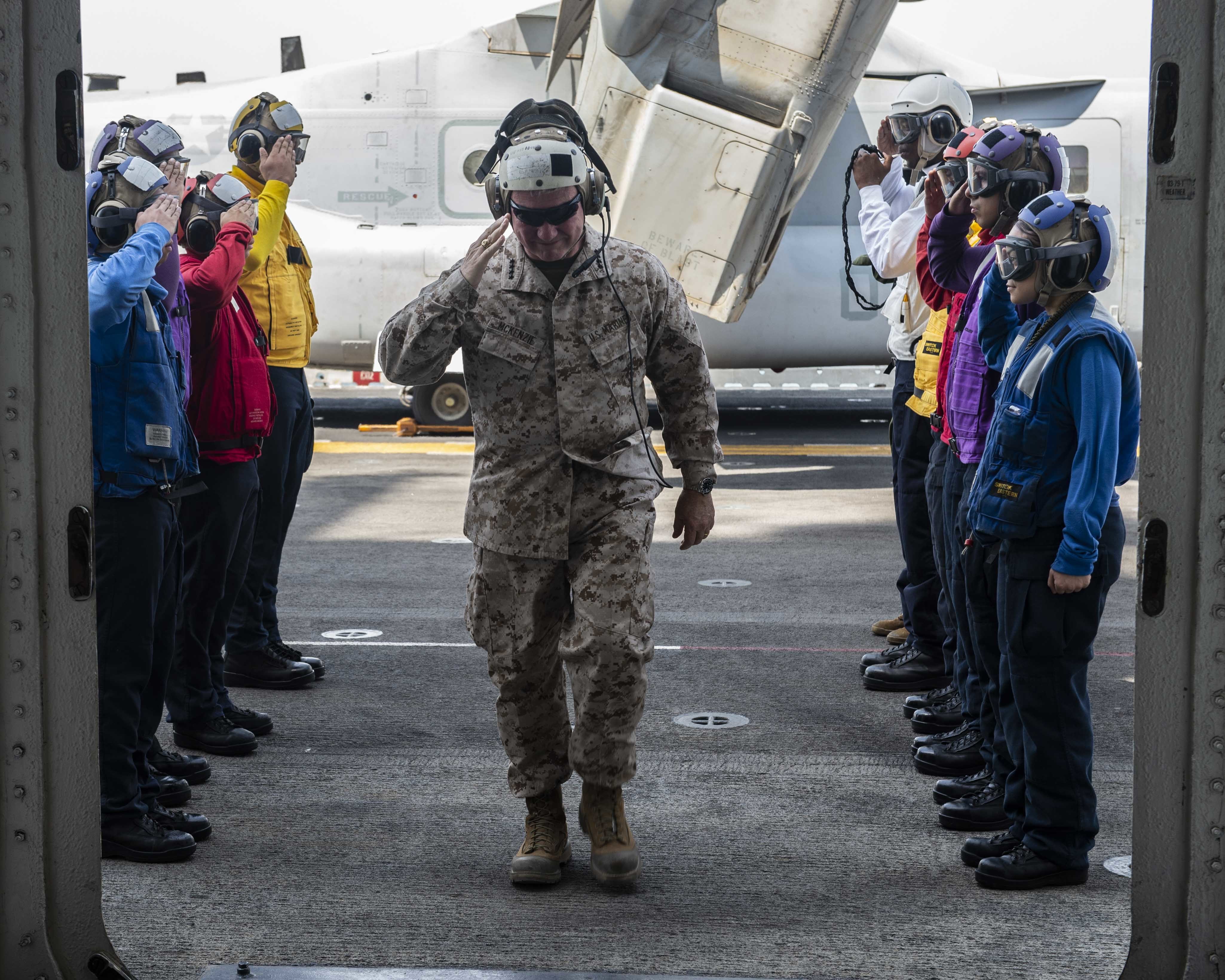
Aircraft carrier presence allows the top American commander in the Middle East flexibility in being able to maintain a state of “contested deterrence” with Iran, lawmakers were told during a Tuesday hearing.
Carriers bring “a uniquely American capability” to the region that are needed in the wake of the heightened tensions that followed the U.S. airstrike that killed Qasem Soleimani, commander of its Quds Force, U.S. Central Command commander Gen. Kenneth McKenzie told the House Armed Services Committee.
“Naval presence is always the most effective” means of deterrence because “you dial it up and dial it down” as required, he said.
The Iranians retaliated with an hour-long missile attack against two air bases occupied by Americans that left about 100 service members being treated for head and brain injuries.
McKenzie said Americans are safer now in the region than they were last year because of the build-up of U.S. land, air and sea forces in the region and the renewed presence of carrier strike groups.
To back that up, McKenzie said the United States is bringing air defense systems to Iraq “to protect ourselves against another Iranian attack.” He added Washington is also deploying missile defense systems to Saudi Arabia and other regional partners following missile attacks that crippled Saudi petroleum production facilities.
He estimated that Tehran has between 2,500 and 3,000 missiles in its growing arsenal.
McKenzie said other measures are being stepped up to protect key American interests like the embassy in Baghdad against attacks by Iranian-backed militias operating in Iraq.
“We have a variety of things to protect us” in Iraq, but “our luck is not going to hold out forever” that targets like the embassy will not come under attack, he added.
In his opening statement, McKenzie said Iran remains a terrorist state that operates “generally in theater [through proxies like Hezbollah in Lebanon and partners like the Houthis in Yemen], but its reach is global.”
On the drawdown of American and coalition forces in Afghanistan, McKenzie said, “we’ll see what happens on the ground” with the Taliban’s compliance to end its attacks in cities and against U.S. and coalition forces.
As matters stand now, the number of American service members in Afghanistan will drop from about 12,000 to 8,600 by the summer but he has “not yet developed military plans” for a full withdrawal in 14 months if the Feb. 29 peace agreement between Washington and the Taliban holds and negotiations open between the Kabul administration of Ashraf Ghani and the Taliban.

McKenzie said the 8,600-number was consistent with the recommendation of Army Gen. Austin Miller, the commander in Afghanistan, to remain effective in the counter-terrorism efforts against al Qaeda and the Islamic State.
He found the continued fighting between the Taliban and Afghan security forces troubling. “To date, Taliban attacks are higher than we believe are consistent with an idea to actually carry out this plan,” he said.
McKenzie added in answer to a later question as to why this is happening, “their command and control is not as rapid as ours” in passing the word to hold back and the Taliban leadership may be fractured in its response over ending the fight.
He emphasized several times “the Taliban need to keep their part of the deal.”
While Ghani indicated Monday that he would begin releasing some of the 5,000 Taliban prisoners the government holds, a part of the agreement with Washington, McKenzie said so far there have been no joint Taliban-Afghan military efforts to take on al Qaeda or the Islamic State.
As for the Taliban’s efforts against the Islamic State, he said, “they’ve been very successful,” but “it was a bloody mess” in terms of casualties.
“It’s more a question of will than capabilities” to determine if the Taliban would militarily confront al Qaeda. The Taliban provided al Qaeda sanctuary, which used Afghanistan as its headquarters to launch the Sept. 11, 2001 terrorist attacks on the United States.
McKenzie reminded the panel the Taliban are not across-the-board popular with the Afghan public. Only 12 percent of those polled approve of them.
“We should not assume they will run to victory” when the United States and coalition forces leave. He wouldn’t presume “the Afghan government is defenseless.” But if it appeared about to collapse, McKenzie said his advice would be “absolutely” not to withdraw any more forces.
At the same hearing, Army Gen. Stephen Townsend, U.S. Africa Command commander, said, al Shabab in Somalia “is the largest most violent arm of al Qaeda” and “remains a significant threat to American interests in the region.”
The danger is al Shabab’s ambitions extend beyond Somalia and neighboring Kenya where it has carried out a number of terrorist attacks.
On the western side of Africa, Townsend said the counterterrorism efforts by the French, other Europeans and the United States are “insufficient and uncoordinated” against al Qaeda and the Islamic State.
“If we don’t turn this around it becomes a problem,” Townsend said.
“Europe should do more before America does more.”





